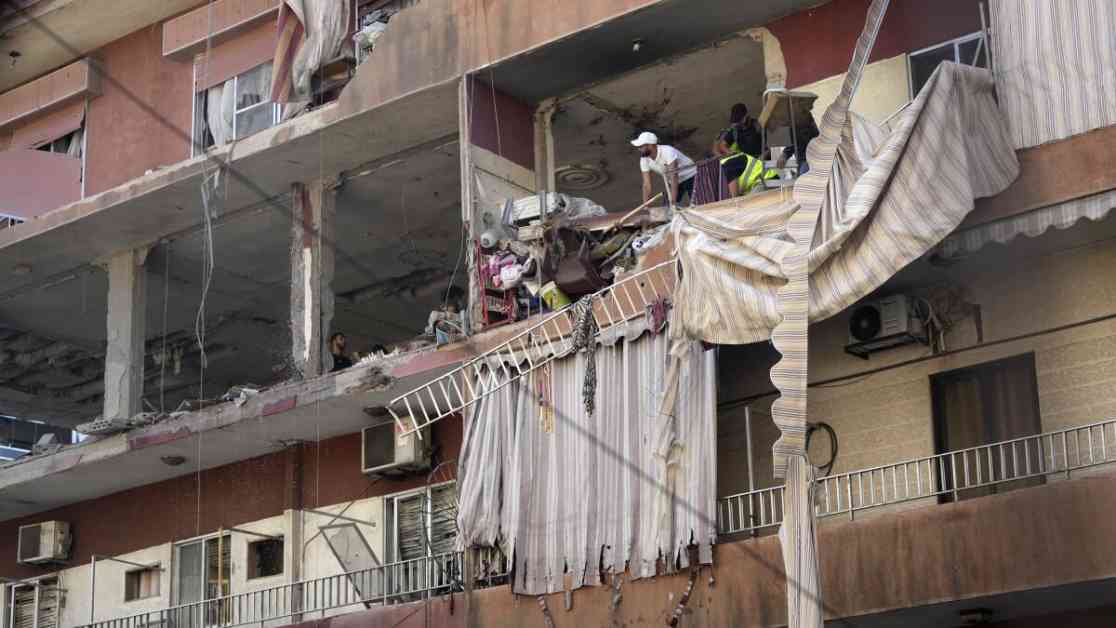Tensions Escalate Between Israel and Hezbollah: Unprecedented Destruction Looms
The ongoing conflict between Israel and the militant group Hezbollah has reached a critical point, with recent events indicating a dangerous escalation in hostilities. What began as a tit-for-tat border conflict has now spiraled into a series of deadly attacks and counterattacks, threatening to unleash unprecedented destruction in the region.
The recent assassination of top Hezbollah leaders in Beirut by Israeli forces, along with a relentless bombardment of sites across Lebanon, has resulted in a significant loss of life on both sides. The intensity of the airstrikes and the mounting death toll have raised concerns about the possibility of a full-scale war breaking out between the two adversaries.
Hezbollah, in response to Israel’s actions, has launched a barrage of rockets that are reaching deeper into Israeli territory, causing widespread panic and forcing thousands to flee their homes. The escalating violence has created a sense of vulnerability in Israel, with fears mounting that the conflict could spill over into neighboring countries, leading to catastrophic consequences.
Reasons for the Conflict
The longstanding enmity between Hezbollah and Israel dates back decades, with both sides committed to each other’s destruction. Hezbollah has cited Israel’s military operations in the Gaza Strip as a reason for escalating its attacks, expressing solidarity with Hamas and vowing to continue its assaults until a ceasefire is reached in Gaza.
Israel, on the other hand, views Hezbollah’s presence on its northern border as a grave threat, especially given the group’s access to sophisticated weaponry that can target Israeli territory with increasing precision. The history of conflict between the two sides, including previous wars and border skirmishes, underscores the volatile nature of their relationship and the deep-seated animosity that fuels their ongoing hostilities.
Past Conflicts and Escalation
The history of conflict between Israel and Hezbollah is marked by periods of intense violence, including the Israeli invasion of Lebanon in 1982, which led to the formation of Hezbollah in response to Israel’s presence in the country. Subsequent clashes and the 2006 war between Israel and Hezbollah resulted in significant casualties and widespread destruction, underscoring the high stakes involved in their ongoing conflict.
The current escalation in hostilities has raised concerns about the potential for the conflict to spread beyond its current borders, drawing in other nations and escalating into a broader regional conflict. The involvement of Iran, a key backer of Hezbollah, and the United States, a staunch supporter of Israel, adds a geopolitical dimension to the conflict that could have far-reaching consequences.
The Prospect of All-Out War
The specter of a full-scale war between Israel and Hezbollah looms large, with both sides engaged in a dangerous game of brinkmanship that could have devastating consequences. The possibility of a broader conflict involving other nations, including Iran and the U.S., raises the stakes even further, with the potential for nuclear dangers and widespread destruction posing a grave threat to regional stability.
Diplomatic efforts to de-escalate the conflict have thus far been unsuccessful, with both sides unwilling to back down from their demands for a ceasefire on their own terms. The Biden administration’s reluctance to pressure Israel or deny it weapons, coupled with the intransigence of key players on both sides, has left little room for optimism regarding a peaceful resolution to the crisis.
The Human Cost of War
As the conflict between Israel and Hezbollah escalates, the toll on civilians in both countries is mounting. The prospect of a full-scale war involving air strikes, ground invasions, and widespread destruction raises concerns about the potential for significant loss of life and displacement of populations.
Hezbollah’s arsenal of sophisticated weaponry, coupled with Israel’s superior air power, could result in a devastating conflict that inflicts heavy casualties on both sides. The impact on civilian populations, already reeling from the effects of previous conflicts and ongoing violence, is a cause for serious concern as the situation continues to deteriorate.
The Path to Peace
Despite the grim outlook for a peaceful resolution to the conflict, diplomatic efforts must continue in order to prevent further escalation and mitigate the humanitarian consequences of war. The international community, including key players such as the U.S., Iran, and regional powers, must work together to find a path to de-escalation and ultimately a ceasefire that can bring an end to the cycle of violence.
As the situation in the region remains volatile and unpredictable, the need for dialogue and diplomacy has never been more urgent. The stakes are high, and the consequences of failure are too grave to contemplate. It is imperative that all parties involved in the conflict prioritize the pursuit of peace and stability in the region, for the sake of all those who stand to suffer from the devastation of war.



























